24+ Will Examples to Download
Creating a will is a vital step in ensuring your final wishes are carried out after your passing. Whether you have substantial assets or simply want to designate guardians for your children, a will provides clear instructions and peace of mind for your loved ones. In this article, we will explore what a will is, provide a step-by-step guide on how to write one, address common FAQs, and conclude with a creative perspective on the significance of this essential legal document.
bb_toc content=”][/bb_toc]
1. Social Media Marketing Will Template

2. Estate Settlement No Will Template
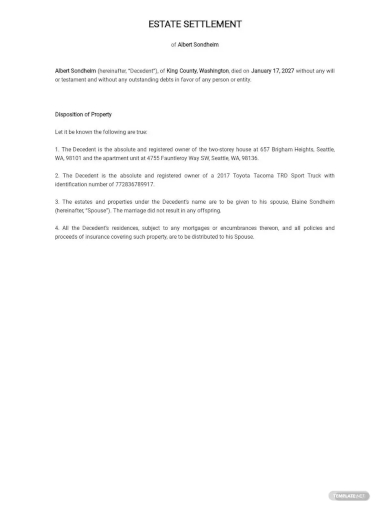
3. Joint Ownership Will Template

4. Last Minute Will Template

5. Legal Codicil to a Will Template

6. Last Will and Testament

unitedwaydanecounty.org
7. Sample Will
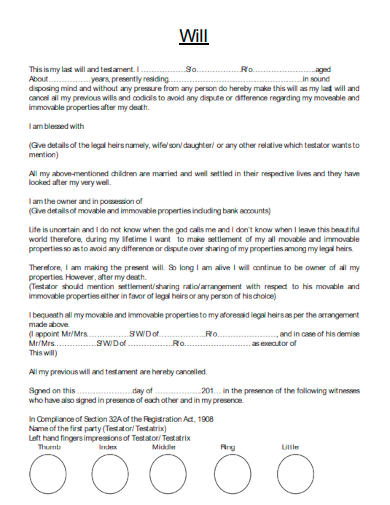
registration.uk.gov
8. Will Deed
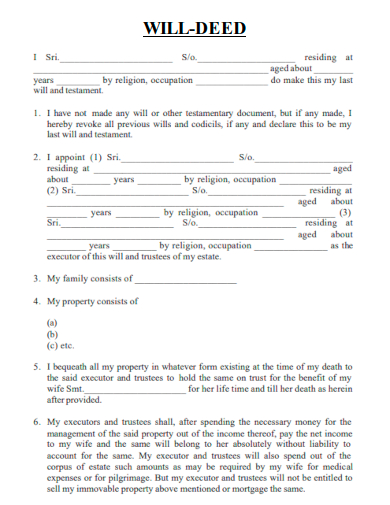
vacourts.gov
9. Anatomy of a Will
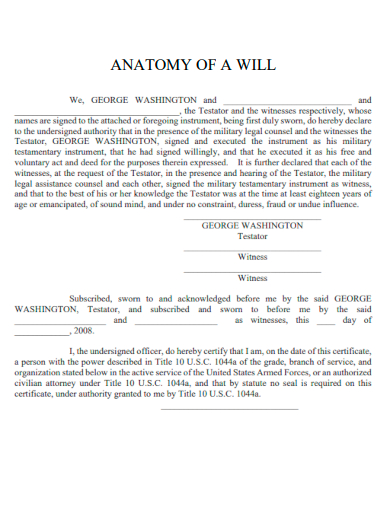
mcieast.marines.mil
10. Will Registration Form
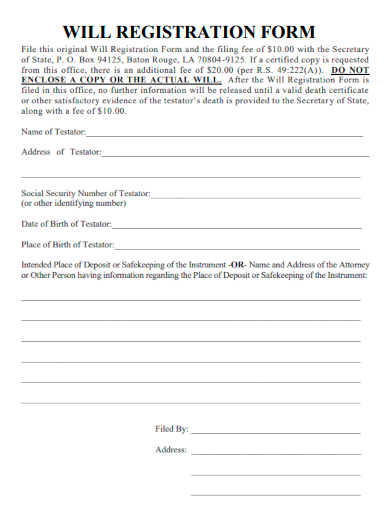
sos.la.gov
11. Proof of Execution of Will
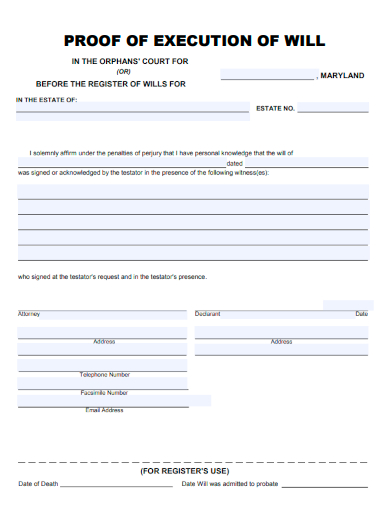
maryland.gov
12. Living Will Declaration
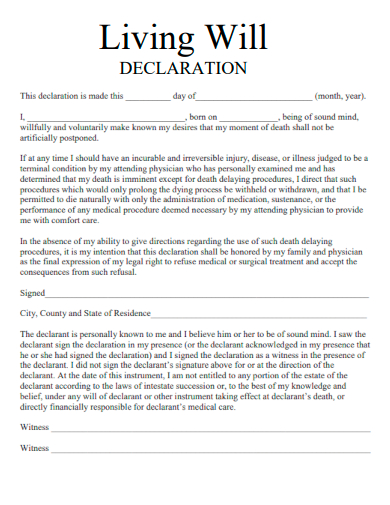
dph.illinois.gov
13. Requirements of a Valid Last Will
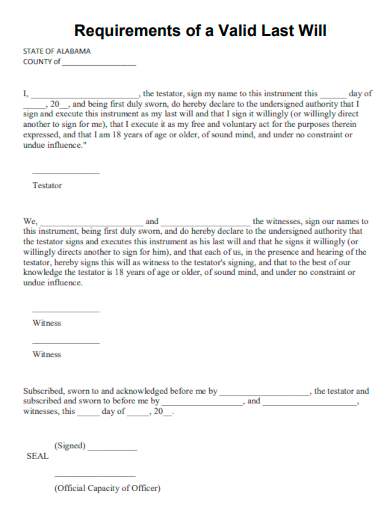
benning.army.mil
14. Holographic Will Form
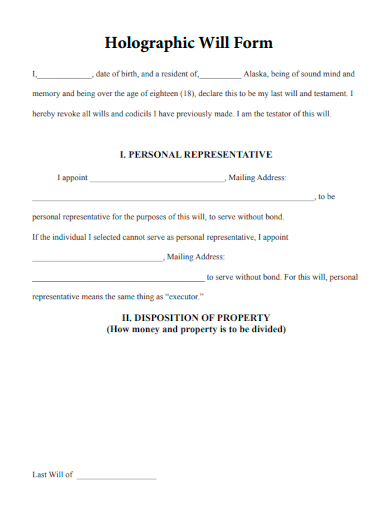
alaskalawhelp.org
15. Example Will
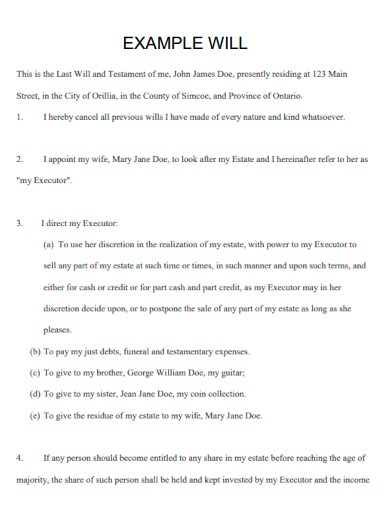
yourlegalrights.on.ca
16. Petition to Probate Will
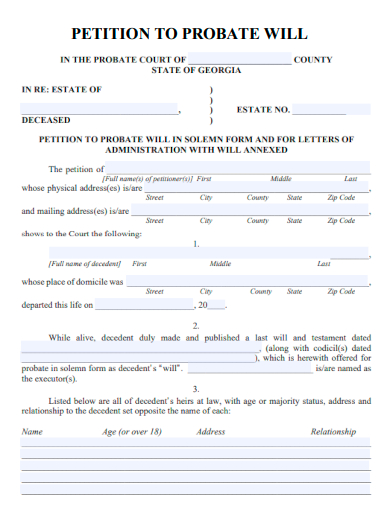
georgiacourts.gov
17. Affidavit of Execution of Will
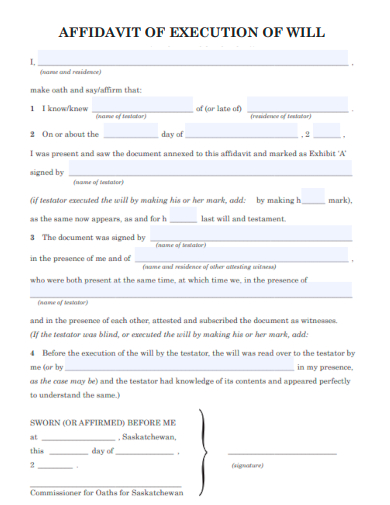
blob.core.com
18. Wills Glossary of Terms
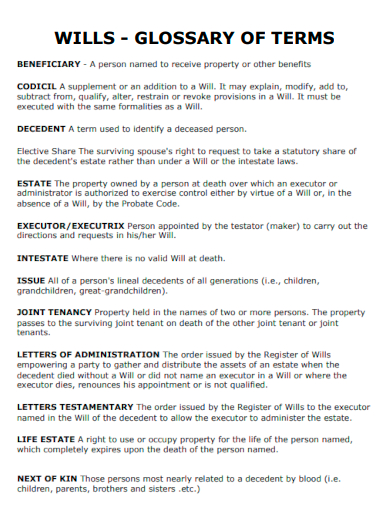
montcopa.org
19. Request for Will Registry Information
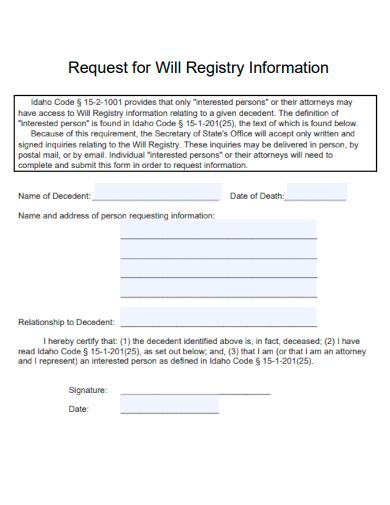
sos.idaho.gov
20. Estate Planning and Will
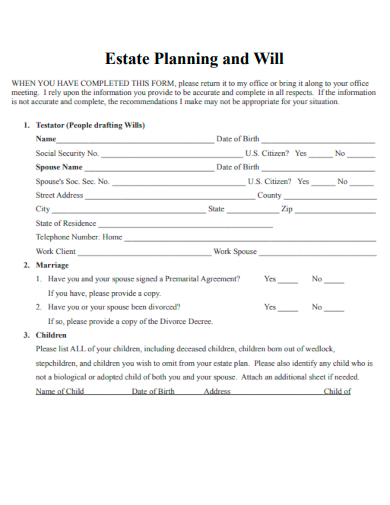
svslawoffice.com
21. Will in Favor of Minor Son
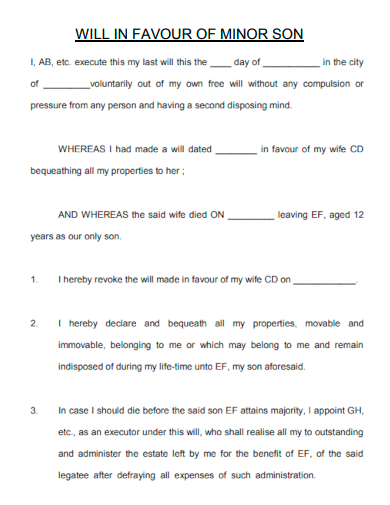
goyalandassociates.com
22. Application for Search of Wills Notice
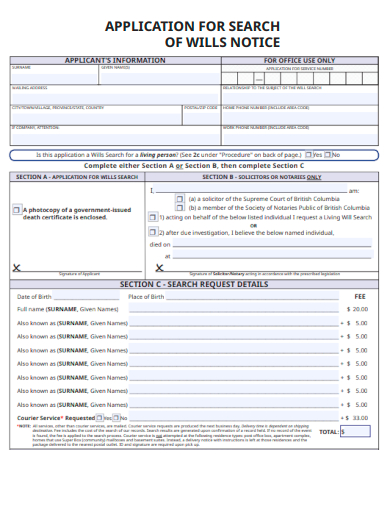
nb.ca
23. Checklist For Making A Will
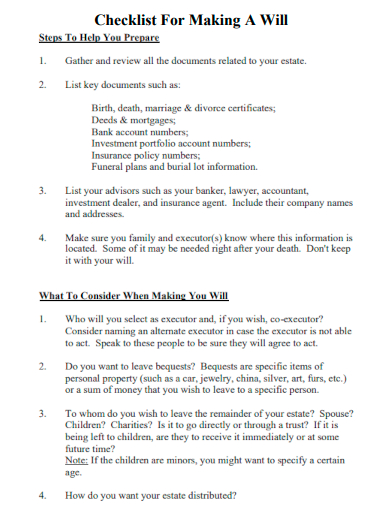
gov.bc.ca
24. Assent for Proof of Will
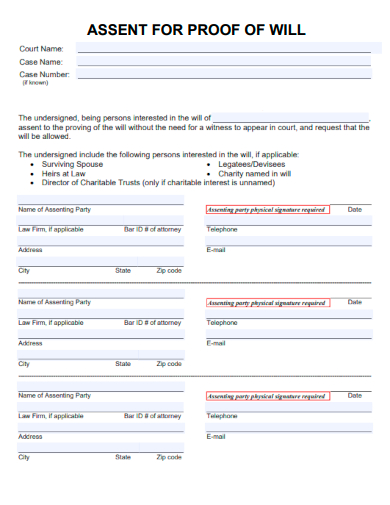
courts.nh.gov
25. Married Will Form
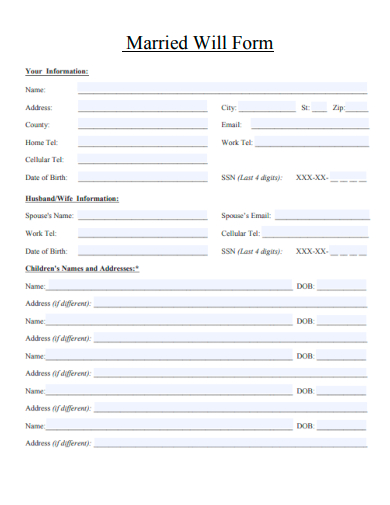
wardlawfirm.com
What is a Will?
A will, also known as a last will and testament, is a legal document that outlines how an individual’s assets, properties, and personal belongings will be distributed upon their death. It serves as a legally binding statement of the testator’s intentions, specifying beneficiaries, guardians for minor children, and any other relevant instructions regarding the estate.
How to Write a Will
While the thought of writing a will may seem daunting, it is a crucial task that can be simplified with careful planning and attention to detail. By following a step-by-step process, you can ensure that your will accurately reflects your wishes. Let’s delve into the essential steps involved in writing a will.
Step 1: Start with an inventory:
Begin by taking stock of all your assets, including bank accounts, investments, properties, valuable possessions, and any outstanding debts. This inventory will serve as a foundation for the distribution of your estate.
Step 2: Choose an executor:
Select a trusted individual to be the executor of your will. This person will be responsible for carrying out the instructions outlined in your will and managing your estate during the probate process.
Step 3: Determine beneficiaries and guardians:
Decide who will inherit your assets and property. Additionally, if you have minor children, designate suitable guardians who will be responsible for their care and well-being.
Step 4: Seek legal assistance:
To ensure the validity and enforceability of your will, it is advisable to consult an attorney specializing in estate planning. They can provide guidance on the legal requirements specific to your jurisdiction.
Step 5: Draft your will:
With the help of an attorney or using a reliable online will-making tool, begin drafting your will. Include all the necessary details, such as the distribution of assets, appointment of guardians, and any specific instructions you wish to convey.
Step 6: Sign and witness the will:
Once your will is complete, sign it in the presence of at least two witnesses who are not beneficiaries. Their signatures will validate the document’s authenticity.
Step 7: Store your will safely:
Keep the original copy of your will in a secure location, such as a safe deposit box or with your attorney. Inform your executor and trusted loved ones about its whereabouts.
FAQs
Can I write my own will without an attorney?
While it is possible to write your own will, seeking legal advice is strongly recommended to ensure compliance with applicable laws and to avoid potential errors that could invalidate your will.
What happens if I die without a will?
Dying without a will, also known as dying intestate, means your assets will be distributed according to the intestacy laws of your jurisdiction. This may not align with your wishes and can lead to complications and disputes among family members.
Can I update my will after it has been written?
Yes, you can update your will as often as necessary. It is important to review and revise your will whenever significant life events occur, such as marriage, divorce, the birth of children, or acquisition of new assets.
A will is not merely a legal document; it is a profound expression of love and thoughtfulness toward your loved ones. By creating a comprehensive will, you can provide clarity and ease the burden on your family during a challenging time. Embracing the opportunity to plan for the future ensures that your legacy lives on as a testament to the life you led and the values you held dear.
24+ Will Examples to Download
Creating a will is a vital step in ensuring your final wishes are carried out after your passing. Whether you have substantial assets or simply want to designate guardians for your children, a will provides clear instructions and peace of mind for your loved ones. In this article, we will explore what a will is, provide a step-by-step guide on how to write one, address common FAQs, and conclude with a creative perspective on the significance of this essential legal document.
bb_toc content=”][/bb_toc]
1. Social Media Marketing Will Template

Details
File Format
Google Docs
MS Word
Size: 33 KB
2. Estate Settlement No Will Template

Details
File Format
Google Docs
MS Word
Size: 30 KB
3. Joint Ownership Will Template

Details
File Format
Google Docs
MS Word
Size: 28 KB
4. Last Minute Will Template

Details
File Format
Google Docs
MS Word
Size: 32 KB
5. Legal Codicil to a Will Template

Details
File Format
Google Docs
MS Word
Size: 21 KB
6. Last Will and Testament

unitedwaydanecounty.org
Details
File Format
PDF
Size: 7 KB
7. Sample Will

registration.uk.gov
Details
File Format
PDF
Size: 9 KB
8. Will Deed

vacourts.gov
Details
File Format
PDF
Size: 5 KB
9. Anatomy of a Will

mcieast.marines.mil
Details
File Format
PDF
Size: 91 KB
10. Will Registration Form

sos.la.gov
Details
File Format
PDF
Size: 110 KB
11. Proof of Execution of Will

maryland.gov
Details
File Format
PDF
Size: 46 KB
12. Living Will Declaration

dph.illinois.gov
Details
File Format
PDF
Size: 85 KB
13. Requirements of a Valid Last Will

benning.army.mil
Details
File Format
PDF
Size: 394 KB
14. Holographic Will Form

alaskalawhelp.org
Details
File Format
PDF
Size: 110 KB
15. Example Will

yourlegalrights.on.ca
Details
File Format
PDF
Size: 27 KB
16. Petition to Probate Will

georgiacourts.gov
Details
File Format
PDF
Size: 1 MB
17. Affidavit of Execution of Will

blob.core.com
Details
File Format
PDF
Size: 54 KB
18. Wills Glossary of Terms

montcopa.org
Details
File Format
PDF
Size: 184 KB
19. Request for Will Registry Information

sos.idaho.gov
Details
File Format
PDF
Size: 1 MB
20. Estate Planning and Will

svslawoffice.com
Details
File Format
PDF
Size: 191 KB
21. Will in Favor of Minor Son

goyalandassociates.com
Details
File Format
PDF
Size: 28 KB
22. Application for Search of Wills Notice

nb.ca
Details
File Format
PDF
Size: 1 MB
23. Checklist For Making A Will

gov.bc.ca
Details
File Format
PDF
Size: 6 KB
24. Assent for Proof of Will

courts.nh.gov
Details
File Format
PDF
Size: 20 KB
25. Married Will Form

wardlawfirm.com
Details
File Format
PDF
Size: 278 KB
What is a Will?
A will, also known as a last will and testament, is a legal document that outlines how an individual’s assets, properties, and personal belongings will be distributed upon their death. It serves as a legally binding statement of the testator’s intentions, specifying beneficiaries, guardians for minor children, and any other relevant instructions regarding the estate.
How to Write a Will
While the thought of writing a will may seem daunting, it is a crucial task that can be simplified with careful planning and attention to detail. By following a step-by-step process, you can ensure that your will accurately reflects your wishes. Let’s delve into the essential steps involved in writing a will.
Step 1: Start with an inventory:
Begin by taking stock of all your assets, including bank accounts, investments, properties, valuable possessions, and any outstanding debts. This inventory will serve as a foundation for the distribution of your estate.
Step 2: Choose an executor:
Select a trusted individual to be the executor of your will. This person will be responsible for carrying out the instructions outlined in your will and managing your estate during the probate process.
Step 3: Determine beneficiaries and guardians:
Decide who will inherit your assets and property. Additionally, if you have minor children, designate suitable guardians who will be responsible for their care and well-being.
Step 4: Seek legal assistance:
To ensure the validity and enforceability of your will, it is advisable to consult an attorney specializing in estate planning. They can provide guidance on the legal requirements specific to your jurisdiction.
Step 5: Draft your will:
With the help of an attorney or using a reliable online will-making tool, begin drafting your will. Include all the necessary details, such as the distribution of assets, appointment of guardians, and any specific instructions you wish to convey.
Step 6: Sign and witness the will:
Once your will is complete, sign it in the presence of at least two witnesses who are not beneficiaries. Their signatures will validate the document’s authenticity.
Step 7: Store your will safely:
Keep the original copy of your will in a secure location, such as a safe deposit box or with your attorney. Inform your executor and trusted loved ones about its whereabouts.
FAQs
Can I write my own will without an attorney?
While it is possible to write your own will, seeking legal advice is strongly recommended to ensure compliance with applicable laws and to avoid potential errors that could invalidate your will.
What happens if I die without a will?
Dying without a will, also known as dying intestate, means your assets will be distributed according to the intestacy laws of your jurisdiction. This may not align with your wishes and can lead to complications and disputes among family members.
Can I update my will after it has been written?
Yes, you can update your will as often as necessary. It is important to review and revise your will whenever significant life events occur, such as marriage, divorce, the birth of children, or acquisition of new assets.
A will is not merely a legal document; it is a profound expression of love and thoughtfulness toward your loved ones. By creating a comprehensive will, you can provide clarity and ease the burden on your family during a challenging time. Embracing the opportunity to plan for the future ensures that your legacy lives on as a testament to the life you led and the values you held dear.

